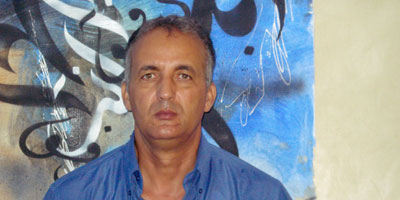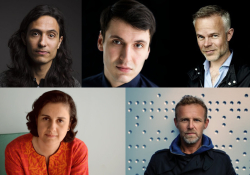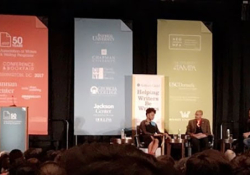Letter from Morocco
Mohamed Nedali’s debut novel, Morceaux de choix: les amours d’un apprenti-boucher, was selected by Nobel laureate J. M. G. Le Clézio as the winner of the Prix Grand Atlas in 2005. I recently visited the writer at his home in Tahannoute to discuss his work.
Toward the end of his reign, Hassan II of Morocco informed his eldest son and heir that “the throne of the Alaouite monarchs is their horse-saddle.” He was making a very specific point: a king had to be ready for action. Hassan had learned this early on. In 1958, three years before he succeeded his father, Mohamed V, Hassan had crushed a rebellion in the Rif Mountains of northern Morocco, turning its green plateaus orange with napalm and killing several thousands. This event foreshadowed the strategies he would employ throughout his thirty-eight-year reign: ruthlessness, repression, and fear. When he died in 1999, the entire country breathed a sigh of relief. As was noted by Abdellatif Laâbi, Morocco’s greatest living poet, who was jailed and routinely tortured between 1972 and 1980 due to his peaceful cultural activism: “The political game had opened up considerably, and it seemed likely that its rules would be decided collectively and no longer, as in the past, by a single man.” A few months after his father’s demise, Mohamed VI addressed his people on national television, promising to be the “king of the poor” and to usher in a new era: greater freedoms, especially for women, better employment opportunities, and transparent governance.
I refuse to leave my country. This is where I must stay and fight. Literature and education are the only means we have to change people’s mentalities.”—Mohamed Nedali
Fifteen years into his rule, Mohamed VI has, instead, earned the sobriquet of “His Majetski,” in honor of his playboy lifestyle—including his tendency to spend millions of dollars on family holidays—and the fact that he has surrounded himself with rapacious cronies. His Majetski’s personal fortune is estimated at just over $2 billion, the result of his near monopoly in three key sectors: phosphate mines, citrus farms, and real estate. While he inherited the first two from his father, real estate has been Mohamed VI’s real innovation since ascending to the throne. As leaked cables from the US consulate in Casablanca confirm, His Majetski owns a piece of every major real estate project in the country: “While corrupt practices existed during the reign of King Hassan II, . . . they have become much more institutionalized with King Mohammed VI. Institutions such as the royal family’s holding company, Omnium Nord Africaine, which now clears most large development projects, regularly coerce developers into granting beneficial rights to ONA.” Still, it could be worse: unlike Pakistan’s Asif Ali Zardari, Mohamed VI can be bought for a measly 5 percent. Adding insult to injury, the cables added, this is a reality “of which most Moroccans dare only whisper.”
One might expect the king to share at least a little of his wealth, but as a recent report issued by TelQuel noted, each public works initiative launched by Mohamed VI has usually met with a 25–40 percent success rate, meaning that when the government identified the need for 373 new primary schools, only 99 were built. The end result of this inefficiency? Only 55 percent of Moroccan children attend secondary school, putting Morocco on a par with Malawi and far behind Bangladesh at 70 percent; poverty’s on the rise; the price of basic foodstuffs keeps climbing; and while half a million graduates enter the job market each year, only one in ten is likely to get a job, most likely thanks to family connections. Nevertheless, it seems His Majetski took his father’s advice to heart: although he swapped his horse for a limousine, he is always on the move: inaugurating a hospital here, an orphanage there. The moral? If you look as though you are working, people might actually believe you.
I have been visiting Morocco since 2009, and I returned last summer to take up a residency at Dar Al-Ma’mûn, an arts foundation situated in the Ourika Valley, roughly twenty kilometers south of Marrakech. Seeking a respite from the heat, my partner Zinzi and I spent a weekend in Essaouira: a whitewashed medina by the seaside that has long been a tourist destination for both Moroccans and Europeans. Once we arrived at the little bird’s nest we’d rented, our host, Hamza, informed us there wasn’t any running water. Not a drop in the entire building, which housed eight families. Hamza complained that this had been going on for weeks, but that none of the tenants wanted to launch a complaint with the city authorities. Not that he thought this would accomplish much. Essaouira has endured severe water shortages for the past couple of years. Most residents grumblingly point their finger at the luxury golf course that opened its doors on the outskirts of town around the same time. To top it off, the city’s pipes are in dire need of maintenance. Later that night, Hamza said: “Every time the king comes to visit, the city officials put up lights, wash the streets and paint the buildings, but the city goes back to being dirty as soon as he’s gone.”
On our return to Marrakech, we were treated to a sight that had already become too familiar: pinkish suburbs rising out of the red, dusty nowhere, rows upon rows of entirely uninhabited villas. These are Morocco’s new ghost towns, the result of an initiative launched by the government in 2004, whereby the state set aside 100 billion dirhams—roughly $11 billion—to house 1.2 million people. No schools or hospitals—just empty houses. I’ve seen this before in southern Italy. The Mafia and corrupt state officials would routinely syphon off public funds set aside to build bridges, which would always be abandoned halfway through, and the rest of the money would of course disappear. Morocco’s housing shortage isn’t to be underestimated. When the Casablanca bombings took place in 2003 and 2007, all the perpetrators hailed from the same shantytown: Sidi-Moumen, ten square miles of hovels northeast of Casablanca. No running water or electricity, with families of five to eight crammed into barely enough space for half that number.
As a teenager, Nedali would catch lifts on the back of cattle trucks and spend his evenings and weekends working in Marrakechi slaughterhouses.
These are the landscapes mapped by the Moroccan novelist Mohamed Nedali, the man I have come here to meet. Nedali was born in 1962 in Tahannoute, a Berber village at the foot of the Atlas Mountains, where his family has resided for generations. His father was a bean farmer, and when the nearly two-decade-long drought that occurred between the early 1970s and the late 1980s destroyed most of his crops, the young Nedali was forced to start providing for his family. As a teenager, Nedali began attending high school in Marrakech, an hour’s drive away. He would catch lifts on the back of cattle trucks and spend his evenings and weekends working in Marrakechi slaughterhouses. After qualifying as a French teacher in his late twenties, Nedali returned to his roots and began working at the newly opened high school in Tahannoute. These experiences would eventually provide the inspiration for his 2003 debut novel, Prime Cuts: The Life and Loves of an Apprentice Butcher, which I am currently translating into English for an American publisher, and which Jean-Marie Gustave Le Clézio selected as the winner of the Prix Grand Atlas in 2005.
I first came across Nedali’s novels in the autumn of 2012, when I was living in Fez. After picking up a copy of Prime Cuts—which had recently been adapted for the silver screen and become a sleeper hit—I voraciously read through his other novels: Thanks to Jean de la Fontaine (2004), The Happiness of Sparrows (2008), Cicine’s House (2010), and Sad Youth (2012). It didn’t take me long to suspect that I had a literary hero on my hands, but confirmation would have to wait until I’d met the man. Zinzi and I arrived in Tahannoute—a quiet village surrounded by groves of olives, almonds, and oranges—in late September, in time for the weekly souk, having been invited by Nedali to lunch with him and his family at his home, a five-minute walk from the school where he’s worked for the past twenty-five years. Nedali’s sixth novel, The Garden of Tears, had just been published, and I was eager to learn more. Here is a brief synopsis: Driss and Souad have just gotten married. Driss is a nurse, while Souad is a waitress at one of Marrakech’s finest hotels. During an evening shift, Souad is assaulted by a drunken police commissioner. The couple file a complaint with the authorities and are forced to look on while everyone tries to sweep the entire affair under the carpet. The witnesses didn’t see anything, and the restaurant’s manager claims Souad provoked the commissioner. Their case is routinely thrown out by one judge after the other. As the hotel manager blithely informs Souad halfway through the novel, “The servants of the state never risk anything in this country, regardless of the crime of which they’ve been accused. The law isn’t designed to hold them accountable, but rather to protect them and cover their tracks in case of any misconduct.”
I arrived in Tahannoute—a quiet village surrounded by groves of olives, almonds, and oranges—in time for the weekly souk, having been invited by Nedali to lunch with him and his family at his home.
The jacket copy mentioned that this was “based on a true story.” Nedali chuckled and ruffled his hair before launching into his tale. Three years ago his wife, Hanane, who also works at the local high school, was approached by a couple of girls who claimed that one of their classmates kept taking pictures of them with his phone. Hanane confiscated the boy’s phone and presumed the matter had been laid to rest. The following day, she was summoned to the principal’s office and confronted by the boy’s parents, who then assaulted her there and then, while the principal—a Muslim fundamentalist who’d been suspicious of Mohamed and Hanane’s liberal politics for years—looked idly on. The boy’s father, of course, was a high-ranking policeman, and the couple subsequently endured the same tribulations faced by their fictional alter egos in The Garden of Tears. Eventually, thanks to Nedali’s fame—he is among the few novelists Moroccan youth will enthuse about—the local media picked up the story, and the region’s governor fired the policeman and issued a public apology. “My wife’s been asking me to emigrate for years now,” Nedali told me over coffee, “but I refuse to leave my country. This is where I must stay and fight. Literature and education are the only means we have to change people’s mentalities.” His Majetski may wish to take note of that.
Philadelphia









